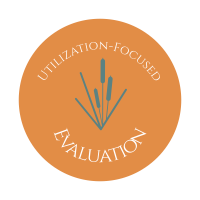Principles-Focused Evaluation
Principles-focused thinking is for principles-driven people engaged in principles-based change. An effectiveness principle provides guidance about how to think or behave toward some desired result (either explicit or implicit) based on norms, values, beliefs, experience, and knowledge. A high-quality principle provides guidance about what to do, is useful for informing decisions and actions, provides inspiration as an expression of values, is relevant to diverse contexts and situations, and can be evaluated. Evaluating a principle involves examining its meaningfulness to those expected to follow it, whether it is being adhered to in practice, and, if adhered to, whether it leads to desired results. For more information on principles, check out Principles-Focused Evaluation, The Guide.
Why Principles?
Change confronts us on all sides, envelopes us from all directions, is omnipresent. We have choices about how we face, engage, and deal with change. Principles inform and guide those choices. They do so by telling us how to act. Change efforts typically are organized and implemented as carefully planned, standardized models aimed at achieving specified program goals. Principles-driven initiatives, in contrast, typically operate in dynamic environments striving to meet and serve the diverse needs of diverse participants. A common mantra of such programs is that “one size doesn’t fit all.” Services are matched to participants’ situations. Processes vary by participant. Outcomes vary for different people. Diversity demands responsiveness. Responsiveness generates variability based on determining what’s appropriate, possible, and relevant. What is the anchor in the midst of such dynamic adaptation? Principles.
Why Principles-Focused Evaluation?
Principles-focused evaluation informs choices about which principles are appropriate for what purposes in which contexts, helping to navigate the treacherous terrain of conflicting guidance and competing advice. What principles work for what situations with what results is an evaluation question. Thus, from an evaluation perspective, principles are hypotheses not truths. They may or may not work. They may or may not be followed. They may or may not lead to desired outcomes. Whether they work, whether they are followed, and whether they yield desired outcomes are subject to evaluation. Learning to evaluate principles, and applying what you learn from doing so, takes on increasing importance in an ever more complex world where our effectiveness depends on adapting to context. Principles guide that adaptation. Principles-focused evaluation examines:
Whether principles are clear, meaningful, and actionable, and if so
Whether they are actually being followed and, if so
Whether they are leading to desired results.
GUIDE for Principles
The GUIDE framework is a tool to help a principles-based programs assess the quality of their principles in preparation for a principles-focused evaluation. Within the framework, a high quality principle (1) provides Guidance, (2) is Useful, (3) Inspires, (4) supports ongoing Development and adaptation, and (5) is Evaluable. Download the GUIDE rubric.
From Patton, Michael. (2018) Principles-Focused Evaluation: The GUIDE. The Guilford Press.
SMART Goals vs. GUIDE Principles
Just as SMART goals (specific, measureable, achievable, relevant, time-bound) emerged as a framework for goals clarification, the GUIDE framework is a set of criteria for clarifying effectiveness principles.
Whereas SMART goals are specific and precise, GUIDE principles provide general guidance.
Whereas SMART goals mandate quantitative indicators and statistical measures, GUIDE principles can be evaluated with multiple methods both quantitative and qualitative.
Whereas SMART goals are calculated and articulated to state outcomes that are achievable, GUIDE principles aim to be inspiring by making explicit and articulating values that guide both how something is done and what the desired result is. Principles are not achievable in the sense that the task is completed and the outcome accomplished; rather principles guide ongoing engagement across many discrete projects and multiple change initiatives.
Whereas SMART goals are written to express the outcomes of a specific project or program, GUIDE principles emphasize broader values-based, ethically grounded utility. Being useful incorporates and subsumes being relevant, because following principles must be meaningful. However, SMART goals focus only on outcomes and not on the process for attaining outcomes; in contrast, GUIDE principles apply to both process and outcomes, to both what is to be achieved and how it is to be achieved.
Finally, whereas SMART goals are time-bound, GUIDE principles provide enduring and ongoing guidance. This is the difference between the project mindset of SMART goals versus the more general strategic thinking and action mindset of GUIDE principles.


